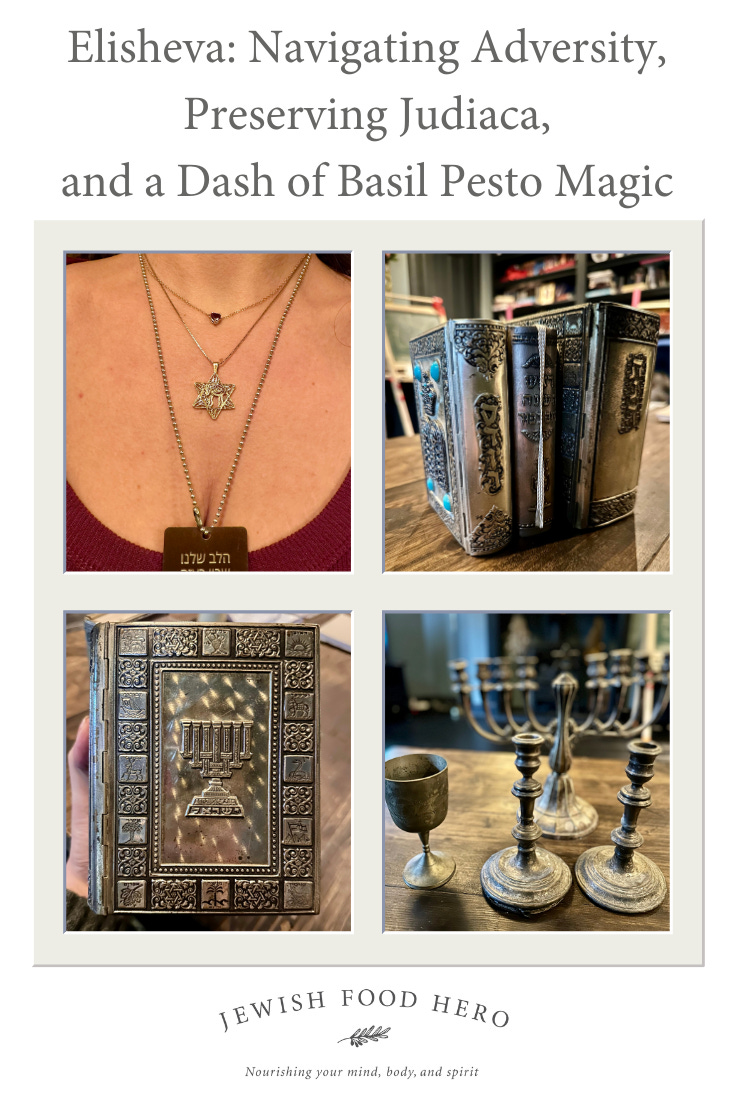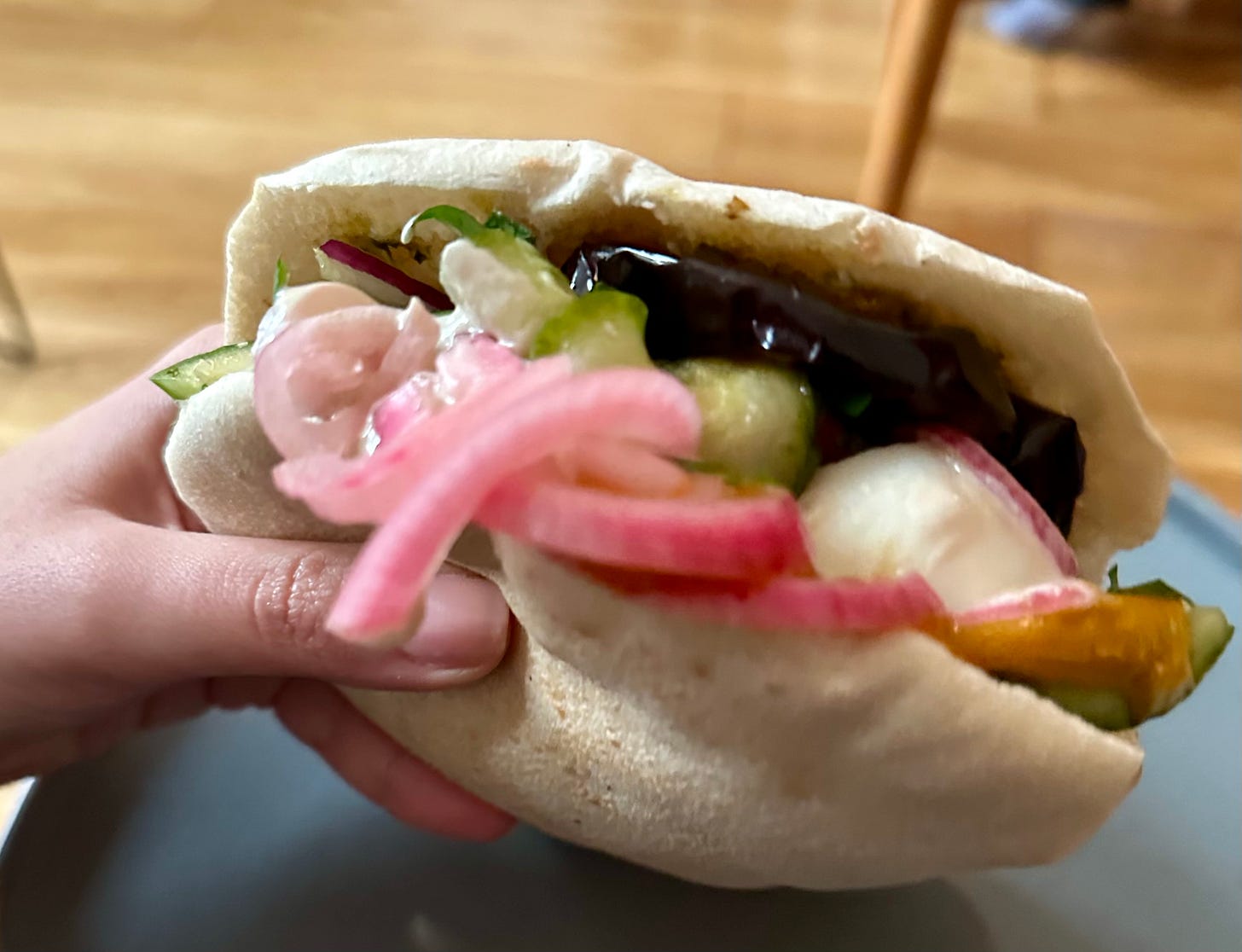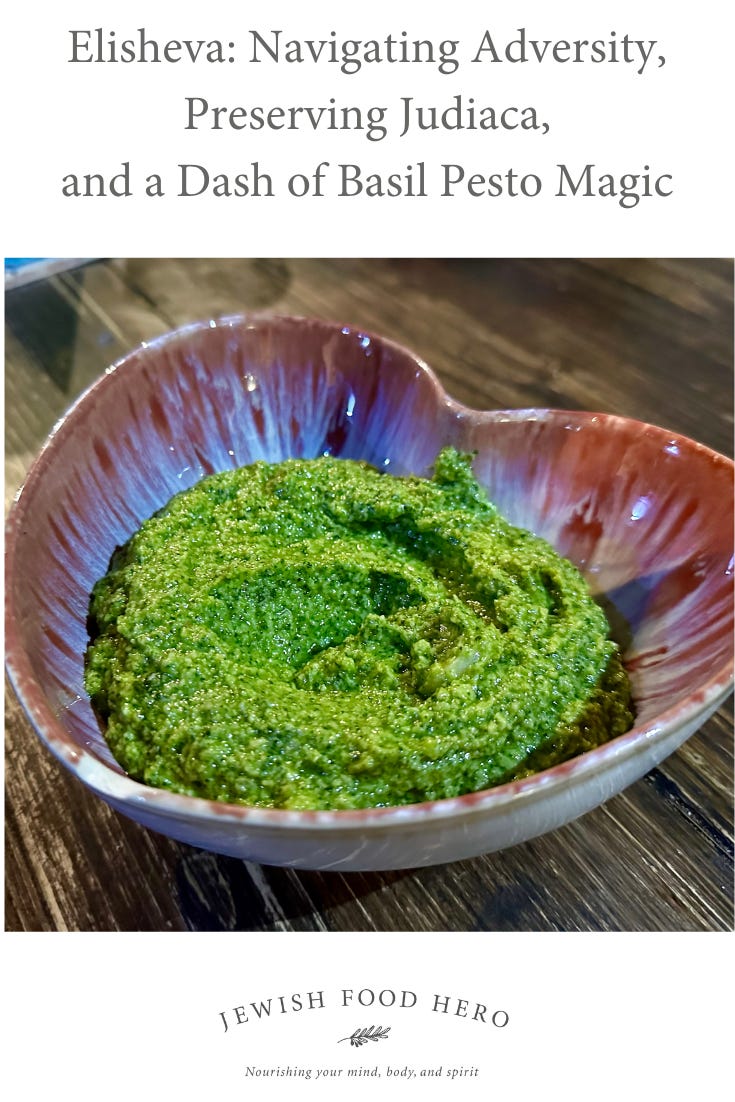Elisheva: Navigating Adversity, Preserving Judaica, and a Dash of Basil Pesto Magic
Elisheva Abramson Interview + Recipe
I am dedicated to listening to women's voices and fostering meaningful conversations. In today's interview, I have the privilege of speaking with Elisheva Abramson.
We are all suffering right now. I wake up angry/sad (anger and sadness are two sides of the same emotional coin); images of IDF soldiers and Israeli hostages float through my mind throughout the day. Two things have been helping me cope. The first is running! The second thing comforting me is connecting to, and listening to, people in our community. I hope that this interview with Elisheva will provide you with a sense of solace amid these challenging days.
I connected with Elisheva online after being positively impacted by her authentic voice on social media, which at once felt comforting, educational and frank.
May we all learn something from Elisheva's experience and wisdom.
BTW, the Hebrew name Elisheva means “devoted to G-d/pledged to G-d”
Can you please introduce yourself to our readers? Share a bit about your background, interests, and what you're currently involved in.
My name is Elisheva and I’m a Jewish advocate and educator working as Social Media Specialist for an NGO called the International Israel Alliance, and am soon to start my role as Scotland-Israel Affairs Officer for the Israeli Embassy in the UK.
I’m an Israeli-American-British woman. I know that’s a mouthful but I’ve had an unusual journey! I was born and raised in Los Angeles to Israeli-American parents. In my early 20s I moved to the UK, fell in love with a British man. My husband converted to Judaism seven years into our marriage. As proselytizing is forbidden in Judaism, I would never have asked or expected him to do this. But early on in our relationship when it became clear we wanted to be together for life, I did need to clarify my expectations regarding how the children we’d have would be raised, considering they’d be Jewish. This discussion meant we weren’t able to have a surprise proposal, but that’s just the way it is when a Jew makes the decision to marry someone from outside our culture. Fortunately everything was seamless and he was more than happy with my expectations. Of course now we know it’s because he had a Jewish neshama all along and marrying a Jewish woman was best for him. From day one he remarked on how at home he felt around my family and the Jewish community in general. It was so natural that even my late grandmother, who was a Shoah survivor and wary of gentiles, insisted he was Jewish even before he decided to convert, much to everyone’s amusement.
I am a registered nurse. Throughout my nursing career, I continued to participate in Jewish advocacy online. After the difficult years working as a specialist nurse during the COVID-19 pandemic, I decided to shift my focus 100% to Jewish advocacy. In my free time I take ballet classes, spend time outside with my kids and dog, and hold game nights with friends – I have a particular love for Dungeons & Dragons. Proud nerd! But the project I’m most excited to be working on at the moment is a novel; it’s a Jewish ghost story.
Could you share your experiences and insights into Jewish life in Scotland? How does the community maintain its traditions and connections, and are there any unique aspects or challenges that characterize Jewish life in this region?
Jewish life in Scotland is challenging. Our community is tiny and remote. We maintain our traditions by holding fast to our relationships with one another. For example, making sure we check in with each other frequently, especially if someone cannot physically make it to synagogue for a period of time. Protecting Jewish traditions is especially important to our community here, where our small numbers put us at risk of disappearing. This manifests with prioritizing Jewish education for the children. Keeping cheider going is truly a community effort. We also benefit from a close, meaningful bond with our rabbi who works extremely hard to make our community as inclusive and welcoming as possible to all Jews who find themselves in Scotland.
Particular challenges to Jewish life in Scotland include inaccessible kosher food (it’s very, very difficult to find) and feelings of isolation. My children are the only Jews at their schools. Antisemitism is a constant issue, so my husband and I work hard to support them in building resilience and self-love.
Living through challenging times can be and feel incredibly sad. Can you tell us about what has been helping you the most to cope with the current situation in Israel? Are there specific activities, routines, or support systems that have been particularly impactful for you?
Keeping in close, frequent contact with my family members in Israel has been helping me the most. I check in with them daily to see how they’re doing, and they do the same for me. I think the unprecedented media coverage of global antisemitism in the wake of October 7th has given Israelis a better window into how scary diaspora life can be. Starting my fundraiser to make therapy more accessible for Israelis and Palestinians was a practical and material way to ensure I’m helping. I hope it reaches its goal so we can help as many survivors as possible.
For my children, working on their Hebrew daily has been strengthening their sense of Jewish pride. They love watching Rechov Sumsum, which is the Israeli version of Sesame Street. My son has started studying for his Bar Mitzvah. It has really given our whole family something to look forward to while he grows into the next stage of his life as a Jew.
As a trauma nurse, you are intimately familiar with the impact of challenging situations on individuals. How has your professional experience influenced the way you navigate and process the trauma resulting from recent events in Israel? Are there insights from your work that have helped you personally during these challenging times?
Oh gosh. My background in Major Trauma has absolutely equipped me with insight. One of the defining moments in my nursing career was being on duty at the bedside in the ICU of St. Thomas’ Hospital in London during the Westminster Bridge terrorist attack. A key truth of trauma is that its real impact reveals itself over time. What we see in the immediate aftermath of an incident is only the tip of the proverbial iceberg. You know when you walk into the coffee table and bump your leg, it only looks a bit red initially, but over the next few days a huge, colorful bruise develops? That’s true across the board for trauma. We will be discovering new consequences of the terrorist attack and this war for years to come.
And it’s impossible to overstate how inextricably linked all aspects of health and well-being are. For this reason, our approach to people impacted by the war needs to be holistic. Physical wounds can cause psychological wounds, and vice versa.
Your online presence is impactful, and it's evident that you share a lot of yourself with your audience. One aspect that stands out is your commitment to raising awareness about antisemitism. Can you tell us more about your approach to creating content in this space? How do you navigate the balance between personal sharing and advocacy, and what kind of impact do you hope to achieve with your online work?
Thank you. I was fortunate to undertake further training in education during my nursing career, so I’ve been able to apply that knowledge to my advocacy work. Ensuring that my educational content meets a high standard is crucial because I have a duty of care to my viewers. Credibility as an educator demands the information I deliver be accurate, citable, up-to-date, and accessible to a wide audience. It also requires that I, myself, present myself authentically. I don’t have an online persona or any type of shtick. A certain level of personal disclosure assures my viewers that I come with an intention of sincerity. Because the subjects I cover are so personal to me, I need to express that. Antisemitism is a life-or-death matter for me and people I love – it’s not just a subject of interest that I can check at the door. But as personal as it is, I cannot let my feelings stop me from being open to challenge. My credibility relies on viewers feeling safe to engage with me in debate. This is a cornerstone of being a good educator. Allowing people to see the real me means we can connect over difficult topics.
Judaica often holds significant cultural and personal value. Could you share with us what Judaica you keep in your home or perhaps wear regularly? Do any of these items have special stories or sentimental importance to you?
I’m blessed to have quite a few family heirlooms in the form of jewelry and ritual items. I wear my late mother’s old magen david almost every day. It’s a really unique piece of tooled gold. My bookshelf holds silver-bound siddurim from 1960s Israel that once belonged to my great-aunt. Some of the most precious items were acquired by my grandfather shortly after the Shoah. He was a Bergen-Belsen Survivor and I am the keeper of his chanukiah, candlesticks, and kiddush cup. They are in need of some restoration, which I hope to have done next year.
How do you incorporate Judaic traditions into your daily life? Are there specific rituals or customs that hold a special place in your heart, especially during challenging times?
As my family is part of a traditional community, Jewish rituals are part of our daily life. We say the Shema daily, bake challah and keep Shabbat, avoid non-kosher food, have mezuzot on all rooms that require one, and my husband wraps tefillin.
Communities often come together during difficult times. How has your local community or wider social circles provided support or comfort during this period? Are there any communal efforts or initiatives that you've found particularly uplifting?
We held a vigil for the Israeli hostages in central Edinburgh. I was glad of it. And many of us made a special effort this year to attend public chanukiah lightings. My husband and I wear the Bring Them Home Now dog tags to help raise awareness.
Looking ahead, what are your hopes for the future, both personally and for the broader Jewish community? Are there specific aspirations or goals that you're working towards, considering the current circumstances?
I think there’s a lot to look forward to, thankfully. Personally, my husband and I plan to move us and our kids to Israel within the next couple of years to be closer to the bulk of our relatives. As wonderful as the UK can be, it’s grown increasingly hard to be Jewish here. In the meantime, I will continue to shine a light in dark corners of the diaspora.
Balancing personal life with the demands of the outside world can be challenging. How do you manage to strike a balance between your personal well-being and any professional or community responsibilities you may have?
Personal boundaries protect me from burning out. I’m pretty good at recognising my limits and honouring them. There’s only one of me, and I can’t help others if I’m not doing well.
In times of adversity, cultural connections can become even more significant. How do you find strength and connection to your Jewish identity during difficult moments? Are there specific cultural practices or expressions that resonate with you?
I love reading Tehillim. They bring me huge comfort and often help me process my emotions if I feel myself bottling up my feelings. I usually do this in the evenings after my daughter goes to bed, when I have a few quiet moments.
When I cook, I always have my Spotify playlist full of Jewish music playing. And since most of the food I make is Jewish food, I can fully immerse myself in this way, which I find very grounding.
Lastly, if there's one message or piece of advice you'd like to share with our readers, especially those who may be feeling heartbroken and scared during this hard time, what would it be?
If you don’t already speak it, learn Hebrew! Even if you feel like you may never reach fluency. Even if a few minutes on Duolingo a few times a week is all you can manage. It’s good for your brain, empowering, and will connect you to the rest of the Jewish community in a practical, productive way.
Elisheva is wearing this dove of peace t-shirt
Food Talk
Can you share some of your favorite Jewish foods with us? Whether they're traditional family recipes or dishes that hold special memories, we'd love to hear about the flavors and experiences that make these foods stand out for you.
Sabich is my favourite Jewish food! It’s got every flavour you could ever possibly want in one package. It’s always the first thing I get when I land in Israel. Here is a picture of the last Sabich sandwich I had in January 2024 in London.
A nostalgic food that brings me back to my childhood is ptitim (Israeli couscous). My mother taught me to toast the coucous a bit in a pan before boiling them. It gives the couscous the nicest flavour. And when I boil the couscous, it’s never in plain water, but either stock or a spicy tomato broth.
Another nostalgic Jewish food from my childhood is schnitzel. My savta used to make huge piles of it for me and my sister. It was always breaded with matzo meal that she’d make herself. She also made the most amazing baba ganoush. It was super smoky because she’d grill the aubergines over an open flame and add more raw garlic than you could possibly imagine.
Elisheva Pesto Recipe
Right off the bat, I want to say that my pesto is the ultimate follow-your-heart recipe. The quantities of ingredients are totally customisable for individual tastes. What’s listed below is purely a guideline!
Ingredients
4 cups fresh basil
1-2 cups toasted pine nuts
1 cup parmesan, hand grated
0.5 cup pecorino, hand grated
3 cloves fresh garlic, minced
¾ cup good olive oil
Salt to taste
Pulse the basil and pine nuts in a food processor until it’s reached a sandy texture. Slowly add some of the oil to soften the mixture before adding the parmesan, pecorino, and garlic. Add the remainder of the olive oil until it’s reached your preferred consistency. Once you’re happy with it, mix in salt to your taste.
Use immediately for pasta, dipping, or as a sandwich spread. It will keep in an airtight container in the fridge for 3-5 days.
In these challenging times, finding solace in shared experiences has been a source of comfort for me. I hope that as you read Elisheva’s interview insights, you too find a sense of connection and shared understanding. If you feel moved, share your main takeaway from this interview and how it resonates with your own experiences.
Am Yisrael Chai
Kenden














Thank you for this interview. I read every installment of Jewish Food Hero and appreciate connecting with you and others in this way!